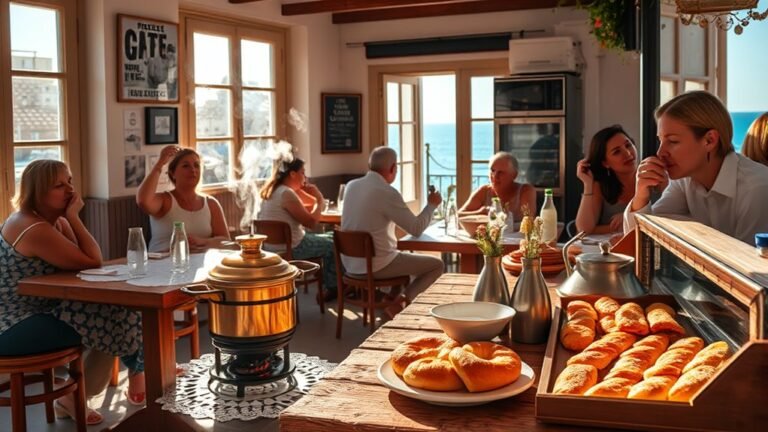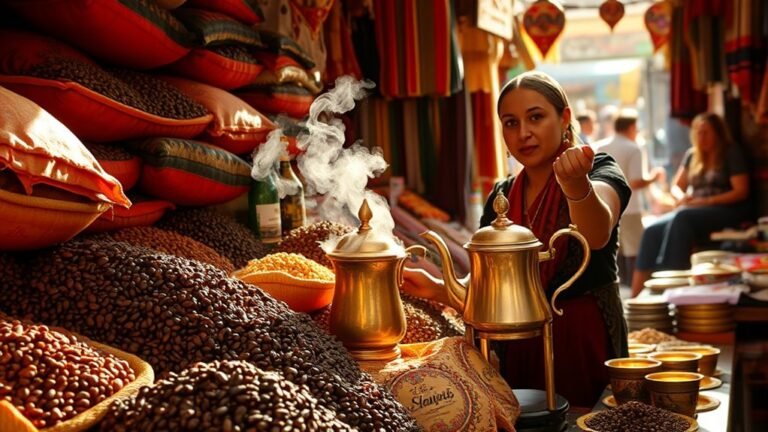The Benefits of Single-Origin Coffee
When you choose single-origin coffee, you gain access to unique flavor profiles defined by specific regional factors like soil, altitude, and climate, resulting in bright acidity or chocolate undertones depending on origin. You’ll also enjoy full traceability, ensuring transparency from farm to cup and verification of sustainable, ethical farming practices. This direct connection enhances your coffee experience by revealing nuanced flavors often lost in blends. Exploring further reveals how these elements transform your daily brew.
Unique Flavor Profiles From Distinct Regions

Although coffee beans are cultivated worldwide, the unique environmental factors of each region—such as soil composition, altitude, and climate—directly influence their chemical makeup, resulting in distinct flavor profiles. When you explore single-origin coffee, you tap into the extensive flavor diversity shaped by these regional characteristics. For instance, high-altitude Ethiopian beans often exhibit bright acidity and floral notes, while beans from lowland Brazilian farms may present nutty, chocolate undertones. This chemical differentiation arises from variations in temperature, rainfall, and mineral content in the soil, affecting compounds like chlorogenic acids and sugars within the beans. By choosing single-origin coffee, you experience a precise expression of terroir, allowing you to savor the nuanced complexities unique to each growing region, enhancing your freedom to select coffees that align with your palate preferences.
Traceability and Transparency in Coffee Production
When you choose single-origin coffee, you gain access to detailed information about the coffee’s journey from farm to cup. This transparency allows you to trace every step within the supply chain, from cultivation and harvesting methods to processing and export. Such traceability empowers you to verify the authenticity and quality of the beans, ensuring they align with your standards and values. Furthermore, single-origin coffee enhances consumer education by providing insights into specific regional practices and environmental conditions affecting flavor. This knowledge frees you from guesswork, enabling informed decisions rather than relying on generic blends with opaque sourcing. Ultimately, the clarity offered by single-origin coffee supply chains supports your pursuit of an unfiltered, genuine coffee experience grounded in accountability and precision.
Supporting Sustainable and Ethical Farming Practices
Because single-origin coffee comes directly from specific farms or regions, you can be confident that your purchase supports sustainable and ethical farming practices. By choosing single-origin coffee, you actively promote:
Choosing single-origin coffee means supporting sustainable and ethical farming directly from dedicated growers.
- Sustainable agriculture: Farmers implement eco-friendly methods, reducing chemical use and preserving soil health, ensuring long-term viability.
- Fair trade principles: Producers receive fair compensation, empowering communities and improving living standards without exploitation.
- Environmental stewardship: Emphasis on biodiversity conservation and water resource management minimizes ecological impact.
This direct connection allows you to support growers committed to responsible practices, empowering them to maintain autonomy and protect their land. Your choice advances a coffee industry aligned with freedom and ethical integrity, fostering systems that prioritize people and planet over profit.
Enhancing the Coffee Drinking Experience

While many coffee options might satisfy your basic caffeine needs, single-origin coffee elevates the experience by offering distinct flavor profiles tied to specific regions, altitudes, and processing techniques. By mastering precise brewing techniques—such as pour-over, siphon, or Aeropress—you reveal nuanced tasting notes unique to each origin. This control over extraction variables guarantees you capture the coffee’s inherent acidity, sweetness, and body, enhancing sensory clarity. You’ll notice complex fruit, floral, or earthy tones that mass-produced blends often mask. Embracing single-origin coffee allows you the freedom to experiment with grind size, water temperature, and brew time, tailoring every cup to your preference. Ultimately, this technical approach transforms coffee drinking into an immersive, personalized ritual rather than a routine caffeine fix.
Building Direct Relationships Between Growers and Consumers
Although sourcing single-origin coffee often involves complex supply chains, building direct relationships between growers and consumers streamlines the process and enhances transparency. When you engage directly with growers, you gain unparalleled insight into cultivation practices, quality control, and ethical standards. This grower connection empowers you to verify authenticity and sustainability claims firsthand. Additionally, consumer engagement fosters mutual accountability and supports fair pricing models, benefiting both parties.
Key advantages include:
- Traceability: You track the coffee’s journey from farm to cup without intermediaries.
- Quality Assurance: Direct feedback loops enable growers to tailor practices to your preferences.
- Economic Empowerment: Eliminating middlemen ensures fair compensation, incentivizing sustainable farming.
Frequently Asked Questions
How Does Single-Origin Coffee Differ From Blended Coffee?
When you choose single-origin coffee, you’re opting for a more “focused expression” of flavor profiles, where beans come from one specific region, offering unique, traceable characteristics. In contrast, blended coffee is a “harmonious mix,” combining beans from multiple areas to achieve a consistent taste. Single-origin grants you sourcing transparency, so you know exactly where your coffee’s from, giving you the freedom to explore distinct terroirs and nuanced flavors with confidence.
What Brewing Methods Best Highlight Single-Origin Coffee Flavors?
When you’re aiming to highlight single-origin coffee’s unique flavor profiles, precise brewing techniques are essential. Pour-over methods like the V60 allow you to control water flow and extraction time, bringing out nuanced fruity and floral notes. Similarly, the Chemex enhances clarity and brightness, while the Aeropress offers versatility to dial in specific tastes. These techniques emphasize the coffee’s distinct origin characteristics, giving you freedom to explore and savor complex flavors with every cup.
Are Single-Origin Coffees Typically More Expensive Than Blends?
Much like choosing a rare vintage over a blended table wine, you’ll find single-origin coffees often command a higher price compared to blends. This price comparison stems from quality factors such as limited harvests, meticulous sourcing, and traceable origins that enhance flavor complexity. When you seek freedom in your cup, paying more reflects the craftsmanship and transparency behind single-origin beans—offering a unique, unadulterated coffee experience worth the investment.
How Should Single-Origin Coffee Be Stored for Freshness?
To maintain single-origin coffee’s peak flavor, you should use airtight storage containers that block light and moisture. Opt for opaque, vacuum-sealed containers made from stainless steel or ceramic to guarantee freshness. Keep your coffee in a cool, dark place away from heat sources. Avoid frequent opening, as exposure to air accelerates staling. These freshness tips help preserve delicate flavor profiles, giving you the freedom to enjoy your coffee’s unique character over time.
Can Single-Origin Coffee Have Health Benefits Compared to Blends?
Did you know single-origin coffee can have up to 30% higher antioxidant levels than blends? This means if you choose single-origin, you might enjoy enhanced health benefits, such as improved cellular protection and reduced inflammation. The distinct terroir and specific bean processing preserve unique phytochemicals, granting you a more potent antioxidant profile. So, if you value freedom in your health choices, opting for single-origin coffee could be a smarter, scientifically backed decision.






